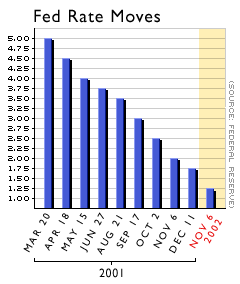NEW YORK (CNN/Money) -
The Federal Reserve held a key short-term interest rate unchanged Tuesday, but expressed uncertainty about the health of the U.S. economy on the eve of war with Iraq.
As widely expected, the central bank's policy-makers unanimously agreed to leave their target for the federal funds rate, an overnight bank lending rate, unchanged at 1.25 percent, the lowest level since 1961.

In the closely watched statement accompanying its decision, however, the Fed said some unusual things, including an admission that it had no idea whether the economy's risks were balanced toward weakness or inflation and that only "heightened surveillance" would help it make up its mind.
"We were expecting boilerplate, and this is well off boilerplate," Mike Ryan, senior fixed income strategist at UBS PaineWebber, told CNNfn's Money Gang program. "We were wondering if they were going to pass or run, but instead they punted."
Reminiscent of previous Fed promises to "closely monitor" the economy, which were shortly followed by surprise interest-rate cuts, some economists took Tuesday's "heightened surveillance" language as a hint central bankers were willing to cut rates before their next meeting, set for May 6.
| 
| |

| 
| 
|

|
 Kathleen Hays takes a closer look at the Fed's latest decision on interest rates, which left many on Wall Street puzzled. Kathleen Hays takes a closer look at the Fed's latest decision on interest rates, which left many on Wall Street puzzled.
|
|
Play video
(QuickTime, Real or Windows Media)
|
| 
|

|
|
Such a cut might come if the U.S.-led war with Iraq goes badly, if terrorist attacks shake consumer confidence, or if the economy's weakness persists beyond a resolution of the Iraq situation. Lower rates make it cheaper for consumers and businesses to borrow, thus pumping funds into the economy.
"That's basically what the statement says: 'If [the economy's weakness] is not [due to] Iraq, we'll ease. If it is Iraq and things clear up, and we get the economy springing back, we'll leave things unchanged,'" said Bank One chief economist Diane Swonk another guest appearing on CNNfn's Money Gang program.
Calling recent economic data "disappointing," Fed policy makers repeated their belief that super-low rates would help the economy rebound after the situation in Iraq is resolved, especially if oil prices continue to fall as they have in recent days.
Nevertheless, in a highly unusual move, they said they couldn't be certain how much damage has already been done to the economy by war fears.
"This is yet another reminder that policy-makers don't have a lock on knowledge," said former Fed economist Lara Rhame, now with Brown Brothers Harriman. "There's a tremendous amount of confusion now about whether or not the recent weakness due to military anxiety is going to end up being self-reinforcing economic weakness."
The Fed's decision, which was widely expected by Wall Street and economists, had little impact on U.S. stock prices, which were mixed in afternoon trade. Treasury bond prices fell.
What happens after the war?
Fed Chairman Alan Greenspan and other economists have said they expect stocks and the economy to rebound smartly if the war in Iraq is short and successful for the United States.
But other observers worry that ending the war won't be such a panacea. In their view, businesses are still in the middle of working off the excess debt and production capacity they took on in the late 1990s boom. Until they clean up that mess, they won't be inclined to spend and hire more, these analysts say.
Meanwhile, consumers -- after building up their own debt by buying low-interest-rate houses and cars through the recession of 2001 and sluggish recovery of 2002 -- may have little reason to run out and spend much more, according to this view.
"The underlying state of the economy is on weak footing, and we're going to need further stimulus to keep the recovery on track," Rhame said.
Economists with this view point to the tepid performance of the stock market and economy after America's success in the first Gulf War, and say the economy could be in for more of the same after Gulf War II.
In any event, for whatever reason, economic activity has clearly slowed in the first quarter of 2003, leading to massive job cuts in February.
Some economists think the Fed should act if only to help ease the pain of the latest slowdown, and fed funds futures contracts -- a gauge of what traders are betting regarding the Fed -- are pricing in a cut by the summer.
| Related stories
|

|
|
|
|
But other economists doubt another Fed rate cut will do much to fix the economy, since its policy actions are designed to increase consumer demand, when what the economy really needs is a rebound in business spending.
What's more, the Fed has very little rate-cutting ammunition left and probably wants to keep its powder dry for worst-case scenarios, rather than be forced to rely on seldom-used methods, such as buying bonds with longer maturities.
"I think their desired stance is to stand pat for an extended period of time rather than cut rates, unless they are confronted with an external shock to the global financial system," said former Fed economist Wayne Ayers, now chief economist at Fleet Boston Financial.
As an alternative, President Bush has proposed massive tax cuts, including the elimination of most personal taxes on dividend income, which he claims will stimulate business investment and lead to job growth.
Greenspan warned Congress to wait before acting on the Bush plan or a more modest Democratic counter-proposal, saying no additional stimulus might be necessary after the war. He also warned that swelling budget deficits could hurt the economy later, a view dismissed by Bush and his supporters.

|

